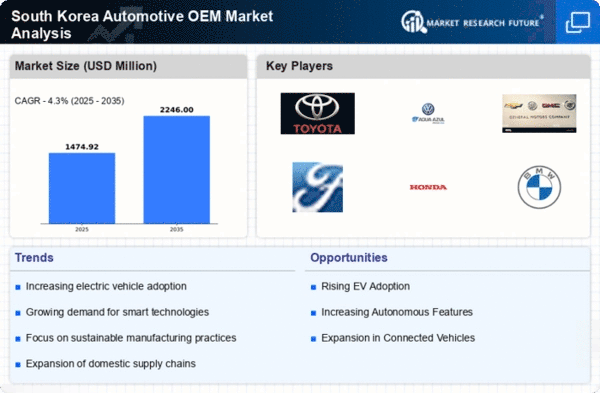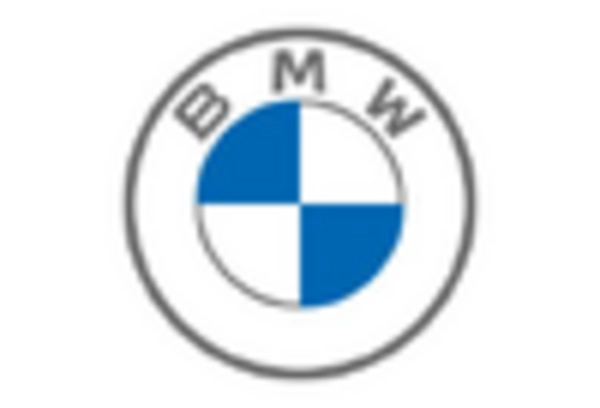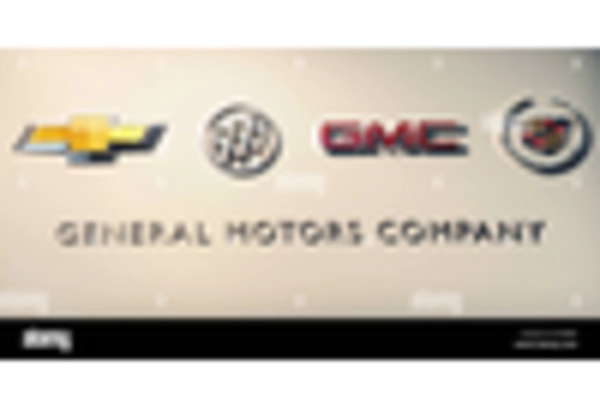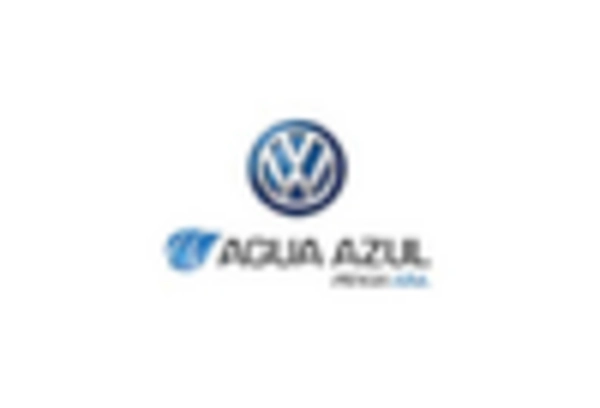Government Incentives and Regulations
Government incentives and regulations significantly influence the automotive oem market in South Korea. The government has implemented various policies aimed at promoting the adoption of electric and hybrid vehicles, including tax breaks and subsidies for consumers. In 2025, it is anticipated that these incentives will lead to a 25% increase in the sales of eco-friendly vehicles. Furthermore, stringent emissions regulations compel manufacturers to innovate and develop cleaner technologies. The automotive oem market must navigate these regulatory landscapes while ensuring compliance, which can drive investment in research and development. As such, the interplay between government policies and market dynamics is likely to shape the strategic direction of the automotive oem market in South Korea.
Rising Demand for Eco-Friendly Vehicles
The automotive oem market in South Korea experiences a notable increase in demand for eco-friendly vehicles. This trend is driven by heightened consumer awareness regarding environmental issues and government initiatives promoting sustainable transportation. In 2025, the market for electric vehicles (EVs) is projected to account for approximately 30% of total vehicle sales, reflecting a significant shift in consumer preferences. The automotive oem market is adapting to this demand by investing in research and development of hybrid and electric models, which are expected to dominate the market landscape. Furthermore, the South Korean government has set ambitious targets for reducing carbon emissions, which further incentivizes manufacturers to innovate and produce greener vehicles. This evolving consumer sentiment and regulatory framework are likely to shape the future of the automotive oem market in South Korea.
Growth of Connected Vehicle Technologies
The growth of connected vehicle technologies is reshaping the automotive oem market in South Korea. As consumers increasingly demand seamless connectivity and integration with digital platforms, manufacturers are compelled to innovate. In 2025, it is estimated that over 60% of new vehicles will feature connected technologies, enabling functionalities such as real-time navigation, remote diagnostics, and vehicle-to-everything (V2X) communication. This trend not only enhances the driving experience but also opens new avenues for data monetization and service offerings. The automotive oem market must adapt to these technological advancements, which could lead to partnerships with tech companies and the development of new business models. As connectivity becomes a standard expectation, the competitive dynamics within the automotive oem market are likely to evolve, emphasizing the importance of technological integration.
Technological Advancements in Manufacturing
Technological advancements play a crucial role in shaping the automotive oem market in South Korea. The integration of automation, artificial intelligence, and robotics in manufacturing processes enhances efficiency and reduces production costs. In 2025, it is estimated that over 50% of automotive production facilities in South Korea will utilize advanced manufacturing technologies. This shift not only improves the quality of vehicles but also allows for greater customization to meet consumer demands. Additionally, the adoption of Industry 4.0 principles enables manufacturers to streamline operations and respond swiftly to market changes. As a result, the automotive oem market is likely to witness increased competitiveness, with companies leveraging technology to enhance their product offerings and operational capabilities.
Consumer Preferences for Advanced Safety Features
Consumer preferences are evolving, with a growing emphasis on advanced safety features in vehicles. The automotive oem market in South Korea is responding to this trend by incorporating cutting-edge safety technologies such as autonomous driving systems, collision avoidance, and enhanced driver assistance systems. In 2025, it is projected that vehicles equipped with advanced safety features will constitute over 40% of new car sales. This shift reflects a broader societal concern for safety and the desire for enhanced driving experiences. Manufacturers are likely to invest heavily in research and development to meet these consumer expectations, thereby influencing the competitive landscape of the automotive oem market. The focus on safety not only enhances consumer trust but also aligns with regulatory requirements, further driving innovation in the sector.
















